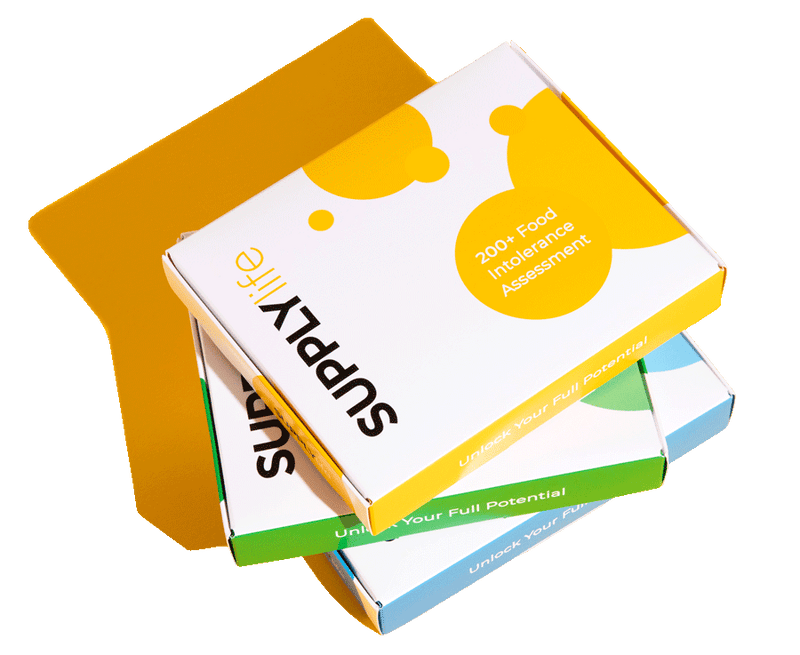Jump to Section
Table of Contents
- What Is Egg Intolerance?
- How Is Egg Intolerance Different From an Egg Allergy?
- Common Causes of Egg Intolerance
- What Are the Symptoms of Egg Intolerance?
- What Foods Contain Eggs?
- Diagnosis and Testing
- Managing Egg Intolerance
- Living with Egg Intolerance
- Emerging Research and Future Developments
- Conclusion
- FAQs
Egg Intolerance
Written by:
 Riya Lakhani-Kanji, MSc, ANutr. Last Reviewed 1st January 2025.
Riya Lakhani-Kanji, MSc, ANutr. Last Reviewed 1st January 2025.
Eggs have long reigned as a culinary cornerstone, serving as a key ingredient in countless recipes. Yet, for many people, this seemingly harmless ingredient can also be a source of discomfort and gastrointestinal stress. Egg intolerance, a condition that is often brushed aside, is a digestive issue where your body struggles to break down egg white proteins, egg yolk proteins, or both. Unlike an egg allergy, which involves the immune system, egg intolerance results in symptoms like bloating, nausea, and fatigue.
It’s estimated that 1-10% of both adults and children face some degree of food hypersensitivity. You may know someone affected by this condition or could be experiencing it yourself. So, if you or a loved one encounter egg intolerance symptoms, it’s really worthwhile to dive into what it means. By understanding it better, you can make smarter food choices and still enjoy your meals to the fullest. Let's take a closer look at what egg intolerance is and how you can manage it.
What Is Egg Intolerance?
When you eat eggs, your body tries to break down proteins like albumin, which is mostly found in egg whites. But for those with egg intolerance, digesting these proteins can be tricky. This often happens because there aren't enough digestive enzymes or there are other gut issues at play, such as irritable bowel syndrome (IBS), or leaky gut syndrome. Instead of the immune response, you’d see in an egg allergy, your body struggles to effectively process these proteins, leading to a whole range of discomfort as they travel through your digestive system in a partly digested state.

As your gut processes these difficult-to-digest proteins, you might find yourself dealing with bloating or stomach cramps as your body attempts to manage the incomplete digestion process. Your digestive tract can become stressed, and that might lead to other symptoms like nausea, diarrhoea, or even fatigue. This discomfort is purely digestive and lacks immunological responses, such as hives or swelling, as seen in egg allergies. But even so, it can heavily impact your daily life, making it necessary to adjust your diet for some relief.
Some of the main proteins associated with egg intolerance include:
- Albumin: The main protein in egg whites, it can be challenging for some people to digest.
- Ovomucoid: This protein, which makes up about 10% of egg white proteins, is heat-resistant and may still cause issues even when eggs are cooked.
- Ovotransferrin: This protein aids in iron transport in the egg white and can lead to digestive discomfort in sensitive individuals.
- Livetin: Found in egg yolks, livetin can cause reactions, particularly in those who still have symptoms after avoiding egg whites.
- Lysozyme: Present in smaller amounts, this protein helps guard eggs against bacteria. Even small quantities can trigger symptoms for those with intolerances, making it important to avoid all parts of the egg.

How Is Egg Intolerance Different From an Egg Allergy?
Egg intolerance and egg allergy are two different conditions that are often mistaken for each other due to their overlapping associations with egg consumption.
An egg allergy is an immune system reaction to proteins found in eggs. This condition is common in babies and young children, typically starting before a child reaches one year old. Fortunately, most children tend to outgrow this allergy during their early years. However, for some, the allergy can last into their teenage years, and in rare cases, it may persist into adulthood.
If someone with an egg allergy eats eggs, their immune system mistakenly identifies these proteins as a threat, leading to more acute symptoms like hives, swelling, or even difficulty breathing. Reactions to an egg allergy usually occur soon after exposure and can escalate quickly. In severe cases, an egg allergy can lead to anaphylaxis—a rapid and potentially life-threatening reaction that requires immediate medical attention.
On the other hand, egg intolerance mainly affects digestion, rather than the immune system. People with egg intolerance might feel uncomfortable after eating eggs, experiencing issues like bloating, gas, or stomach pain. These symptoms arise from difficulty digesting egg proteins and can appear a few hours after consuming eggs. Since they do not involve the immune system, egg intolerance symptoms are generally less severe and do not pose the same life-threatening risks as an allergy.

Common Causes of Egg Intolerance
Enzyme Deficiencies
At the core of egg intolerance is often a problem with enzyme deficiency. Your body needs specific digestive enzymes to break down and absorb proteins found in various foods, including eggs. The three main digestive enzymes responsible for this process are pepsin, trypsin, and chymotrypsin.
Pepsin is the first enzyme to act on proteins in your stomach. If your stomach doesn’t produce enough pepsin, proteins may not be broken down properly, leaving larger pieces to move into the small intestine.
In the small intestine, trypsin and chymotrypsin, continue breaking down proteins. Trypsin cuts proteins in specific spots, while chymotrypsin works on different areas. If your body doesn’t make enough of these enzymes, you might have trouble digesting proteins, especially those in eggs, making it harder for your body to absorb them.
When there aren't enough enzymes, undigested proteins can lead to gastrointestinal symptoms like bloating, gas, and abdominal pain. Also, certain conditions like IBS or leaky gut syndrome can worsen enzyme deficiencies. People with IBS often have heightened sensitivity in their digestive systems, making it harder for them to process food. Leaky gut syndrome, on the other hand, can damage the intestinal lining, making it difficult for the body to absorb nutrients and use enzymes properly.
Gut Dysbiosis
Your gut microbiome is important for keeping your digestive health on track. When there’s an imbalance in that delicate ecosystem—known as gut dysbiosis—it can lead to food intolerances, including egg intolerance. If anything disrupts this balance—like taking antibiotics, consuming excessive amounts of sugar, or even experiencing stress—it may make it harder for your system to handle egg proteins, leading to discomfort and malabsorption issues.
Genetic Factors
You might be surprised to learn that food intolerances can sometimes be passed down through the family. If you have relatives who deal with egg intolerance or digestive problems, it’s possible you could be more prone to these issues too. While genetics isn't the only piece of the puzzle, knowing your family history can really help when it comes to managing your symptoms.
Food Processing
The way you cook your eggs can have a big impact on how your body handles them, especially if you’re someone with an egg intolerance. Different cooking methods change the structure of egg proteins, which can make them easier or harder to digest, depending on the person.
For example, when eggs are subjected to high temperatures for extended periods, as in frying or baking, the proteins can undergo changes that create new and sometimes complex structures. These alterations may increase the difficulty of digestion for some individuals, potentially leading to symptoms like bloating, gas, or discomfort.
On the other hand, gentler cooking methods, such as boiling or poaching, typically expose the eggs to lower temperatures and shorter cooking times. This can result in the proteins being more readily broken down, making them easier for many people to digest.
Understanding these differences in cooking techniques can be essential for those with egg intolerance, as it allows them to choose methods that may reduce adverse reactions and promote better digestive comfort.
What Are the Symptoms of Egg Intolerance?
Egg intolerance can lead to a variety of uncomfortable symptoms, which primarily affect the digestive system, but may also impact other areas. Here are some of the most common symptoms you might experience:
- Bloating: A common sensation of fullness or tightness, often accompanied by discomfort.
- Cramping: Sharp or dull pain in the stomach area, often associated with gas or bloating.
- Nausea: An unsettled feeling that may lead to vomiting or a withdrawn appetite.
- Indigestion: Feeling of discomfort or heaviness after eating, sometimes leading to burping or heartburn.
- Diarrhoea: Loose or watery bowel movements that can occur frequently and may result in dehydration if they persist.
- Nervousness: Feelings of anxiety or unease may arise after consuming eggs, which can further contribute to physical stress.
- Sweating: Unexplained perspiration may occur as the body reacts to the intolerance, possibly accompanied by flushed skin or a sensation of warmth.
- Mild Rashes: Small patches of red, irritated skin that may be itchy or tender to the touch.
- Itching: An irritating, prickling sensation that may lead to scratching.
- Headaches or Migraines: Throbbing or pulsating pain, often coupled with sensitivity to light or sound.
- Breathing Problems – Asthma-like Symptoms: Difficulty in breathing, wheezing, or a tight chest may occur, particularly in those with existing respiratory issues.
- Fatigue: Persistent feeling of tiredness or exhaustion that is not relieved by rest.
- General Discomfort: A vague but pervasive sense of unease or distress that can affect daily activities.
If you have an egg intolerance, you might not feel the effects right away; symptoms could start to show up a few hours after eating eggs. Everyone reacts differently—some people might feel really uncomfortable, while others have milder symptoms. By figuring out that you have an intolerance and taking steps to manage it, like avoiding eggs or finding alternatives, you can help lessen those uncomfortable feelings and improve how you feel overall.
What Foods Contain Eggs?
Eggs are commonly used in many foods, showing up in everything from breakfast favourites to baked goods and sauces. If you're dealing with egg intolerance and need to avoid eggs, it’s helpful to know where they might be hidden. Here’s a list of foods to avoid with egg intolerance:
Baked Goods:
- Cakes
- Cookies
- Muffins
- Pancakes
- Waffles
- Brownies
- Bread (including yeast breads)
- Pie crusts
Dairy Products:
- Custards
- Puddings
- Ice cream and some frozen desserts
- Creams (like pastry cream)
Sauces and Dressings:
- Mayonnaise
- Hollandaise sauce
- Caesar dressing
Processed Foods:
- Quiches
- Egg salad
- Pasta (especially homemade or fresh pasta)
- Some meat substitutes (e.g., certain veggie burgers)
Snacks and Confectioneries:
- Certain types of chocolate
- Meringues
- Marshmallows
Breakfast Foods:
- Certain breakfast cereals
- Granola bars (some brands use eggs as a binding agent)
International Dishes:
- Chawanmushi (Japanese savory egg custard)
- Spanish tortilla
- Shakshuka (poached eggs in sauce)
- Egg curry
Other Foods to Check:
- Speciality breads (like brioche or challah)
- Certain snack bars or protein bars
- Pre-packaged meals and frozen foods
- Breaded foods (like certain frozen chicken nuggets or fish sticks)
Stay Label Smart
Reading food labels can be easy once you know what to look for! Start by checking the ingredient lists for common egg-derived ingredients like lecithin and albumin, which can pop up in unexpected places, from salad dressings to chocolates.

Also, keep an eye out for terms like ovum or ovoglobulin, as these can indicate the presence of egg proteins. Baked goods, sauces, and processed foods often use eggs for binding and texture, so pay special attention to these items.
If you’re ever unsure, choose products that are clearly labelled as "egg-free" or certified as allergy-friendly for extra peace of mind. You might also want to check out vegan products, which are usually free from eggs and other animal ingredients. Many brands now offer tasty alternatives, including egg-free mayonnaise, baked goods, and even egg substitutes made from plant-based ingredients like aquafaba or tofu. These options can help you enjoy a wide variety of dishes without worrying about eggs!
If you’re intolerant to chicken egg proteins, there’s a good chance you might react to proteins found in other bird eggs as well. It’s something to keep in mind if you’re exploring different types of eggs!

Diagnosis and Testing
Figuring out if you have an egg intolerance can be a little daunting, but there are steps you can take to find clarity. Here are some helpful steps you can follow to diagnose and test for egg intolerance:
Keep a Food and Symptom Diary to Identify Triggers
When it comes to identifying egg intolerance, self-observation is key. One of the best ways to get started is by keeping a detailed food and symptom diary. This means jotting down everything you eat throughout the day, along with any symptoms you experience afterwards, no matter how minor they may seem.
As you keep tracking your meals and symptoms, you might start to see some patterns. For example, you could find out that eating eggs or dishes with eggs makes you feel bloated or gives you a stomach ache. Spotting these connections can help you figure out what foods or components of eggs that may be causing your issues.
Plus, having this diary is great when you talk to doctors or nutritionists. They can look at your notes and get a better idea of what's going on with your body. So, grab a notebook, or even use an app on your phone, and start recording!
Remove Eggs Systematically
An elimination diet can be a powerful tool for identifying food intolerances, and one of the most common culprits people investigate is eggs. To start, you’ll need to completely cut eggs out of your diet for about 4-6 weeks. During this time, it's important to pay close attention to how your body responds. Are your digestive issues improving? Is there less bloating or discomfort? This self-observation period is crucial.
Once you’ve noticed some improvements, the next step is to reintroduce eggs slowly and carefully. Start with a small amount and see how your body reacts over a few days. If symptoms start to come back, it might confirm that eggs are the problem. This systematic approach not only helps you pinpoint food intolerances, but also provides valuable insights into how various foods affect your body as a whole.
Professional Testing
If you've been wondering whether you might be sensitive to eggs, it might be worth looking into an egg intolerance test. These tests are specifically designed to pinpoint reactions to egg proteins, making it easier for you to understand what’s going on with your body.
So, how does it work? Typically, you’ll undergo a blood test, which can tell you if your body reacts negatively to eggs. This scientific approach takes the guesswork out of the equation and gives you clear information to guide your dietary choices.
At Supply Life, we really want to help you get the answers you’re looking for when it comes to food sensitivities. Our food intolerance tests are perfect for figuring out if you have an egg intolerance or other sensitivities. What’s great about these tests is that they give you a complete picture of your health, so you can make informed choices about your diet. With that knowledge, you’ll be able to tailor your meals to fit your unique needs and feel your best!

Unlock your full potential today
Get your easy to use food intolerance test today
Additionally, discussing your concerns with healthcare professionals is an essential step in this journey. They can help you interpret your test results and recommend the most effective dietary changes. Having their expert guidance enhances your experience and ensures you receive personalised support that directly addresses your specific health needs.

Managing Egg Intolerance
Managing egg intolerance might seem challenging at first, but it opens up a whole new world of culinary creativity! Start by taking a close look at food labels; eggs can pop up in surprising places, so be sure to check for ingredients like albumin or lecithin. Focusing on whole foods is a great strategy, as they’re less likely to contain hidden egg ingredients. Plus, cooking at home lets you have full control over what goes into your meals.
When it comes to replacing eggs in your recipes, there are plenty of easy and nutritious substitutes you can use. Here’s a quick reference guide to some great alternatives:
- Flaxseed Meal: Use 1 tablespoon of flaxseed meal mixed with 3 tablespoons of water as a binder. This works well for pancakes and muffins, adding a lovely nutty flavour.
- Applesauce: Swap in 1/4 cup of unsweetened applesauce for each egg to boost moisture. This is perfect for cakes and sweet breads.
- Aquafaba: The liquid from canned chickpeas can be whipped like egg whites, making it a fantastic leavening agent for fluffy meringues and mousses.
- Mashed Banana: Use 1/4 cup of mashed banana to replace one egg. It adds moisture and works well in sweet treats like banana bread and muffins.
- Silken Tofu: Blend 1/4 cup of silken tofu to create a creamy texture, ideal for dense baked goods like brownies.
- Chia Seeds: Similar to flaxseeds, mix 1 tablespoon of chia seeds with 3 tablespoons of water for a binding effect. This is particularly handy in cookies and puddings.
Feel free to experiment with these alternatives to discover what suits your favourite recipes the best. Not only do these substitutes cater to egg intolerance, but they also come with added health benefits, allowing you to create delicious dishes without sacrificing taste or texture.
Egg-Free Meal Ideas
Meal planning and prepping without eggs can be both simple and nutritious. Here are some ideas to help you create delicious egg-free meals.

Egg-Free Breakfasts
- Overnight Oats: Combine rolled oats with almond milk, chia seeds, and your favourite fruits for a quick, protein-packed breakfast. Just prepare it the night before, and you're ready to go in the morning!
- Avocado Toast: Top whole-grain bread with smashed avocado, cherry tomatoes, and a sprinkle of hemp seeds for added nutrition.
- Chickpea Pancakes: Whisk chickpea flour with water, herbs, and spices to create a savoury pancake, perfect for topping with sautéed vegetables.
Egg-Free Snacks
- Nut Butter Apple Slices: Spread almond or peanut butter on apple slices and sprinkle with cinnamon for a wholesome snack.
- Trail Mix: Mix together nuts, seeds, dried fruits, and dark chocolate chips for a quick, on-the-go energy boost.
- Hummus and Veggies: Pair hummus with sliced carrots, cucumbers, and bell peppers for a refreshing and crunchy snack.
Main Meals Without Eggs
- Quinoa and Black Bean Bowl: Combine cooked quinoa, black beans, avocado, and fresh salsa for a hearty and nutritious bowl.
- Stir-Fried Tofu and Vegetables: Sauté tofu with a variety of seasonal vegetables and a splash of soy sauce for a filling main dish.
- Lentil Soup: Cook lentils with tomatoes, carrots, celery, and spices for a comforting and protein-rich soup.
As you explore these meals, consider incorporating a variety of herbs and spices to enhance flavours, and experiment with different grains and legumes to keep your diet diverse and exciting. Embracing an egg-free lifestyle doesn't have to be limiting; it can lead to discovering new, delicious ingredients and recipes that nourish both your body and palate.
Avoiding Cross-Contamination
When dealing with egg intolerance, being mindful in shared kitchen spaces is key. To keep your meals egg-free, it’s helpful to use separate utensils, cutting boards, and cooking surfaces just for your food. Before cooking, make sure to clean any shared kitchen tools thoroughly to get rid of any potential egg residues. By taking these simple steps, you can avoid accidental exposure and enjoy your meals without worrying about hidden egg proteins.
Nutritional Considerations for Egg Intolerance
Eggs are a good source of quality protein, as well as iron, biotin, folate, pantothenic acid, riboflavin, selenium, and vitamins A, D, E, and B12. But the good news is, you can absolutely meet your nutritional needs without them!
With a bit of creativity in your meal planning, you'll discover a world of delicious alternatives that can help you maintain a balanced and healthy diet. By focusing on a colourful and varied array of foods, you'll be able to pack in all the nutrients your body needs.
|
Nutrient |
Sources |
|
Protein alternatives |
Legumes: lentils, chickpeas, black beans, kidney beans Nuts and seeds: almonds, walnuts, chia seeds, hemp seeds, pumpkin seeds, sunflower seeds Quinoa & other grains: quinoa, amaranth, bulgur |
|
Iron sources |
Leafy greens: spinach, kale, swiss chard, collard greens Legumes: beans, lentils, peas, edamame Fortified foods & nuts: fortified cereals, pumpkin seeds, cashews |
|
Biotin (vitamin B7) sources |
Nuts & seeds: almonds, walnuts, sunflower seeds, peanuts Fruits: avocado, bananas Sweet potatoes: sweet potatoes |
|
Folate (vitamin B9) sources |
Leafy greens: spinach, arugula, kale, mustard greens Legumes: lentils, chickpeas, black beans Fruits & vegetables: citrus fruits, beets, avocados |
|
Pantothenic acid (vitamin B5) sources |
Whole grains: brown rice, oats, whole wheat bread, barley Mushrooms: portobello, shiitake, button mushrooms Potatoes & avocados: potatoes, avocados |
|
Riboflavin (vitamin B2) sources |
Nuts: almonds, peanuts, sunflower seeds Mushrooms: portobello, shiitake Leafy greens: spinach, swiss chard |
|
Selenium sources |
Nuts: brazil nuts Seeds: sunflower seeds, chia seeds Whole grains: brown rice, barley, whole wheat bread |
|
Vitamins A, D, E, and B12 alternatives |
Vitamin A: carrots, sweet potatoes, butternut squash, dark leafy greens Vitamin D: fortified plant-based milk, UV-exposed mushrooms, fortified cereals Vitamin E: almonds, hazelnuts, sunflower seeds, spinach Vitamin B12: nutritional yeast, fortified plant milks, fortified cereals |
Removing eggs from your diet isn't just about finding other ways to get essential nutrients; it can also come with surprising health benefits. For one, cutting back on eggs can lower your cholesterol intake, which is beneficial for your heart health, especially for those worried about cholesterol levels. Plus, eating more plant-based foods can help you increase your fibre intake, which supports a balanced gut microbiome. So while eggs may be nutritious, exploring a diet without them can open up new ways to eat healthy.
Living with Egg Intolerance
Coping with egg intolerance can sometimes feel a bit tricky, especially when it comes to social gatherings and shared meals. But don’t worry—there are ways to navigate these challenges while still having a good time!
Embrace Social Gatherings
When it comes to events and get-togethers, open communication is key. Don’t hesitate to share your dietary needs with friends and family. Most people are more than happy to accommodate you once they understand your situation. A simple conversation can go a long way in making you feel included and stress-free at social events.
Meal Prep Tips
Having delicious egg-free options ready to go can really make a difference when you're managing egg intolerance. It's all about finding easy-to-prepare recipes that fit into your busy lifestyle. Why not try creating a weekly meal plan? This way, you can streamline your cooking and eliminate the guesswork on those hectic days.
Batch cooking or meal prepping is a fantastic strategy. Set aside a few hours on the weekend to cook up a storm and portion out meals for the week ahead. For example, you could whip up a big batch of colourful vegetable stir-fry with a nutritious non-egg protein, like tofu or chickpeas. Or, consider making a hearty vegetable soup loaded with beans and seasonal veggies—perfect for a quick lunch or dinner!

Grain bowls are another great option. You can cook a large batch of quinoa or brown rice and combine it with roasted veggies, avocado, and a tasty dressing. This way, you can mix and match throughout the week to keep things fresh and interesting. Plus, when you have your go-to egg-free meals prepped and ready, you’ll always have something tasty and satisfying on hand, without the stress of last-minute cooking!
Connect with Others
Sometimes, it helps to know you’re not alone in this journey. Consider joining support groups or online forums for people with food intolerances. These communities can be a great source of advice, encouragement, and shared experiences. Connecting with others who understand what you’re going through can make a big difference.
One of the best things about being part of these communities is getting to swap recipes! It’s fun to discover new meal ideas and share your recipes with others. You might come across some tasty alternatives to your go-to dishes, or even find exciting new ways to use ingredients that work for your diet. Plus, it really opens up the door to creativity in the kitchen. You never know—someone’s recipe might just become your new go-to dish!
Emerging Research and Future Developments
Recent research is showing a clear link between gut health and food intolerances, especially through the study of the gut microbiome, which is the collection of different microorganisms living in our digestive system. These bacteria play a crucial role in how well we digest food, absorb nutrients, and maintain our overall health.
A significant study conducted by scientists from Stanford Medicine and the University of Chicago looked at the gut bacteria of twins, comparing those with food allergies to those without. They studied 13 pairs of twins and discovered that the twins who had food allergies had less variety in their gut bacteria. This suggests that having a more diverse range of gut bacteria may help protect against food allergies and sensitivities. This opens up new possibilities for treatments that could adjust our gut bacteria to help with both food allergies and intolerances in the future.
There are also many exciting developments happening in the field of gut microbiome research. For example, scientists are exploring ways to change gut bacteria to help people with various food intolerances. One promising treatment is called enzyme therapy. This therapy involves adding specific enzymes to help break down troublesome foods, potentially allowing people to eat a broader variety of foods without issues. Researchers are hopeful that similar approaches could also be beneficial for those with egg intolerance, enabling those with an intolerance to enjoy a wider range of foods without discomfort.
As research continues to grow, there’s hope for new strategies that focus on improving gut health and helping those who experience food intolerances.
Nicholas Scott's Journey to Better Digestive Health
Nicholas Scott knew it was time to take action when he started feeling uncomfortable with his diet. Wanting to get to the bottom of it, he decided to take a food intolerance test with Supply Life.
"My test results confirmed some existing concerns I had about my diet—namely, that I have a dairy intolerance and that beer irritates my gut," he noted. "I was also made aware of other triggers I hadn’t previously considered, such as egg whites causing me discomfort."
Following up with Kieran, a knowledgeable nutritionist at Supply Life, provided clarity on his results and helped him understand how to improve his gut health. "He was really helpful and knowledgeable," Nicholas said. Overall, he's very glad he took the test, finding it to be a valuable step towards better health.
Feeling unsure about your own food sensitivities? Take it from Nicholas—there's no reason to put it off any longer! If you’re experiencing discomfort, consider a food intolerance test with Supply Life. We test for Egg White and Egg Yolk as well as Alpha-Lactalbumin, Beta-Lactoglobulin, Casein, Milk (Buffalo), Milk (Cow), Milk (Goat) and Milk (Sheep). It could be just what you need to start feeling better and unlock a healthier you!

Unlock your full potential today
Get your easy to use food intolerance test today
Conclusion
Egg intolerance can disrupt your daily routine with those unpleasant digestive symptoms that are often hard to ignore. Understanding the root causes is the first step toward finding relief. By keeping a food diary, trying an elimination diet, and seeking guidance from healthcare professionals, you can pinpoint the triggers that affect you.
Managing egg intolerance isn’t just about avoiding eggs; it’s about making informed food choices and discovering suitable substitutes to ensure you still get all the nutrients your body needs. With a little planning, you can enjoy a varied and satisfying diet, even when dining out with friends. Just remember to take precautions against cross-contamination at home and in shared spaces to keep your meals safe.
While navigating life with egg intolerance can be challenging, the good news is that it is entirely manageable with the right strategies and support. You can always reach out to your healthcare provider for guidance, and consider intolerance testing to help tailor a plan that’s just right for you.
As you think about what to do next, have you considered trying a food intolerance test from SupplyLife? It could help you uncover sensitivities you didn’t even know you had, which means you can really fine-tune your diet. With the right information, you’ll feel more confident in managing your symptoms and making choices that work best for you!
FAQs
Can egg intolerance develop later in life?
Yes, egg intolerance can indeed develop later in life. While some people may have symptoms from a young age, others might discover that their tolerance changes as they get older. This can happen for various reasons, like shifts in diet, gut health, or just the natural aging process. If you start to notice new or worsening symptoms after eating eggs, it’s a good idea to listen to your body and reach out to a healthcare provider for advice.
Is egg intolerance permanent?
Egg intolerance isn’t always a lifelong condition. It can differ from person to person, and some people may find that their tolerance changes over time. Factors like your gut health, changes in your diet, and overall well-being can all play a role in whether the intolerance sticks around or fades away. So, it’s definitely worth keeping an eye on how you feel and talking to a healthcare professional if you notice any changes!
Can I eat baked goods with eggs if I have an intolerance?
If you have an egg intolerance, it really depends on how sensitive you are and how the eggs are used in the baked goods. Sometimes, the baking process can change the proteins in eggs, which makes them easier to digest for some people with mild intolerances. However, this doesn’t apply to everyone, and you might still experience symptoms. It’s a good idea to start with small amounts and see how you feel, or you can choose egg-free alternatives to avoid any discomfort altogether!
What’s the difference between egg intolerance and lactose intolerance?
Both egg intolerance and lactose intolerance are related to digestion, but they involve different substances and reactions in the body. Egg intolerance happens when your digestive system has trouble breaking down certain proteins in eggs, which can lead to discomfort and other symptoms. On the other hand, lactose intolerance is due to a shortage of lactase, the enzyme needed to digest lactose, the sugar found in milk and dairy products. This can result in symptoms like gas, bloating, and diarrhoea after consuming dairy. It’s important to note that neither condition involves the immune system, which is what sets them apart from allergies.
What are the best egg substitutes for cooking?
There are plenty of great egg substitutes, depending on what eggs do in your recipe. For binding, you can easily make a gel by mixing 1 tablespoon of flaxseed meal or chia seeds with 3 tablespoons of water and letting it sit for a few minutes. If you're looking to add moisture to your baked goods, unsweetened applesauce is a great choice—just use about 1/4 cup for cakes, muffins, and brownies. For a hint of sweetness, try using 1/4 cup of mashed banana, which also helps keep things moist. Additionally, the liquid from canned chickpeas, known as aquafaba, can be whisked to replace egg whites in recipes like meringues and macarons. Understanding the purpose of eggs in your dish will help you easily select the best substitute for your cooking needs!
Does how eggs are cooked (fried, boiled, baked) affect symptoms?
Absolutely! How eggs are cooked can impact the symptoms experienced by those with egg intolerance. The cooking process changes the structure of egg proteins, which can make them easier to digest for some people. For example, some individuals might find boiled eggs more tolerable than fried ones, depending on how their digestive system reacts. However, everyone is different, so you might still experience symptoms no matter how the eggs are prepared. One helpful tip is to keep a food diary; tracking what you eat can help you identify which cooking methods work best for you.
Are raw eggs harder to digest than cooked eggs?
Yes, raw eggs are typically harder to digest than cooked eggs. When you cook eggs, the heat changes the protein structure, making it easier for your body to break them down and absorb their nutrients. If you have an egg intolerance, you might find that cooking methods like boiling or poaching make digestion easier, since they further break down the proteins.

Written by: Riya Lakhani-Kanji, MSc, ANutr
Riya is a certified nutritionist with a passion for plant-based nutrition. Holding both a bachelor's and a master’s degree in nutrition, she skillfully blends her expertise with her writing to create insightful and engaging content focused on health and wellness.
Sources
Allergy prevalence: useful facts and figures. (n.d.). https://www.allergyuk.org/about-allergy/statistics-and-figures/
Digestive enzymes and digestive enzyme supplements. (n.d.). https://www.hopkinsmedicine.org/health/wellness-and-prevention/digestive-enzymes-and-digestive-enzyme-supplements
Does eating eggs increase my risk of heart disease? (n.d.). https://www.bhf.org.uk/informationsupport/heart-matters-magazine/news/behind-the-headlines/eggs-and-heart-disease
Egg allergy. (n.d.). https://www.anaphylaxis.org.uk/fact-sheet/egg-allergy/
Egg allergy. (2022). https://www.mayoclinic.org/diseases-conditions/egg-allergy/symptoms-causes/syc-2037211
Elimination Diet. (2023). https://www.webmd.com/allergies/allergies-elimination-diet
Everything you need to know about egg intolerance. (2023). https://www.verywellhealth.com/egg-intolerance-5224700
Fecal microbiome and metabolome differ in healthy and food-allergic twins. Journal of Clinical Investigation. (2021). https://www.jci.org/articles/view/141935
Food allergies: learn more – food allergies: diagnosis and treatment. (2006). https://www.ncbi.nlm.nih.gov/books/NBK447115/
Dysbiosis. (2024). https://my.clevelandclinic.org/health/diseases/dysbiosis
Impact of cooking preparation on in vitro digestion of eggs simulating some gastrointestinal alterations in elders. Journal of Agricultural and Food Chemistry. (2021). https://pmc.ncbi.nlm.nih.gov/articles/PMC8719756/#:~:text=Thus%2C%20hard%2Dboiled%20and%20poached,enhance%20protein%20digestibility%20in%20elders
Living with Food Intolerance. Gazzola, A. (2005). https://www.google.co.uk/books/edition/Living_with_Food_Intolerance/O7WIDwAAQBAJ?hl=en&gbpv=0
Ovomucoid. (n.d.). https://www.sciencedirect.com/topics/neuroscience/ovomucoid
Proteolytic enzymes: how they work, benefits and sources. (2018). https://www.healthline.com/nutrition/proteolytic-enzymes
What’s the difference between food sensitivity, intolerance, and allergy? (2024). https://zoe.com/learn/what-is-food-sensitivity-intolerance-and-allergy
What to know about egg intolerance. (2024). https://www.medicalnewstoday.com/articles/egg-intolerance#_noHeaderPrefixedContent
Other Intolerances
-

Gluten
-

Lactose
-

Yeast




